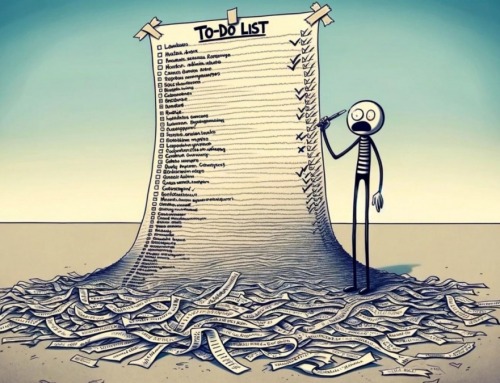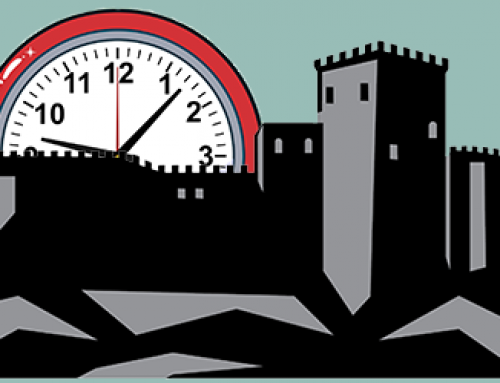You are not a product of your circumstances. You are a product of your decisions.
Just like most of you, we’re all experiencing some emotional and mental whiplash from the last few weeks. The Coronavirus is gripping the world’s attention and rapidly changing the way all of us live and do business. It’s no longer business as usual. Temporarily, we have no normal to speak of. Most everything is changing.
Every change, large or small, presents known and unknown opportunities and dangers. In fact, that’s happening right now.
If you’re currently leading an organization, a team, or even your own family through this change, being able to identify and articulate these opportunities and dangers is essential.
Let’s come back to leadership and the need to help yourself, your family, and your organization reframe the present in just a moment.
The need for level-headed leadership: never let emotions overpower intelligence.
PlanPlus Online is based on the best practices of time management and productivity. Some of these practices originated with Benjamin Franklin
When presented with a difficult circumstance, Franklin wrote:
“My way is to divide half a sheet of paper by a line into two columns; writing over the one Pro, and over the other Con. Then during three or four days’ consideration, I put down under the different heads short hints of the different motives, that at different times occur to me, for or against the measure… if after a day or two of further consideration, nothing new that is of importance occurs on either side, I come to a determination accordingly.”
I’m sorry Benjamin, but that doesn’t work so well in these types of circumstances. The problem is that a pro-con list tends to polarize people based on how they interpret the challenge. It doesn’t provide a safe-space to explore what’s happening and what might happen. We don’t really know which aspects of the current Coronavirus challenges will produce positive results and which will produce negative results.
It’s not what you look at that matters, it’s what you see.
To help me explain what I mean, I remember a Chinese Proverb that goes something like this…
A farmer and his son had a beloved stallion who helped the family earn a living. One day, the horse ran away and their neighbors exclaimed, “Your horse ran away, what terrible luck!” The farmer replied, “Maybe so, maybe not. We’ll see.”
A few days later, the horse returned home, leading a few wild mares back to the farm as well. The neighbors shouted out, “Your horse has returned, and brought several horses home with him. What great luck!” The farmer replied, “Maybe so, maybe not. We’ll see.”
Later that week, the farmer’s son was trying to break one of the mares and she threw him to the ground, breaking his leg. The villagers cried, “Your son broke his leg, what terrible luck!” The farmer replied, “Maybe so, maybe not. We’ll see.”
A few weeks later, soldiers from the imperial army marched through town, recruiting all the able-bodied boys for the army. They didn’t take the farmer’s son, still recovering from his injury. Friends shouted, “Your boy is spared, what tremendous luck!” To which the farmer replied, “Maybe so, maybe not. We’ll see.”
The moral of this story, is, of course, that no event, in and of itself, can truly be judged as good or bad, lucky or unlucky, fortunate or unfortunate, but that only time will tell the whole story. That is, time and your individual outlook or perspective.
There is opportunity in every danger.
So how do you guide engage your team or family in a dialogue about this? You might want to start by saying:
“It’ll be interesting to see what happens and how all of this evolves. Instead of spending time identifying pros and cons or plusses and minuses, why don’t we discuss potential Opportunities, perceived Dangers, and identify Interesting Points about things we just don’t know right now or that we find interesting.
“Right now is the time to decide what our legacy will be. Let’s not leave that up to chance. What’s the story we want to proudly tell when asked, ‘How did you get through it? What did you do?’”
Instead of dividing a piece of paper or a whiteboard into Pro and Con columns, divide it into three columns, label them: Opportunities, Dangers, and Interesting Points. This helps you and your team safely explore circumstances and changes. It helps you focus on the possibilities and opportunities that lie ahead.
 Start listing what could be considered an opportunity, what things might be dangers, and, if things don’t really fit into either of those categories, or if there’s questions, list them as Interesting Points.
Start listing what could be considered an opportunity, what things might be dangers, and, if things don’t really fit into either of those categories, or if there’s questions, list them as Interesting Points.
Use this exercise to figure out what could go wrong, and how to protect against the downside. Expect the best, but prepare for the worst. Identify routines and processes will be impacted by this challenge and be better prepared to adapt those behaviors as the change takes place.
Now is the time of invest your energy in the things you can control.
It’s time to become aware of where you focus your attention. Stephen R. Covey wrote about the differences between your “Circle of Concern” and your “Circle of Influence.”
A Circle of Concern encompasses the wide range of concerns we have, such as our health, our children, problems at work, the government, and even the Coronavirus.
A Circle of Influence encompasses those concerns that we can do something about. They are the concerns we have some control over.
Covey defines “Proactive” as “being responsible for our own lives… our behavior is a function of our decisions, not our conditions.” Proactive people focus on issues within their circle of influence. They work on things they can do something about. The nature of their energy in doing this is positive, enlarging, and magnifying. They increase their Circle of Influence.
“Reactive” people tend to neglect those issues that are under their control and influence. Their focus is elsewhere and their Circle of Influence shrinks.
It’s time to stop worrying about things in your Circle of Concern and focus on what you literally have control and influence over.
We invite you to be strong. Things will get better. It may be stormy now, but never rains forever.






